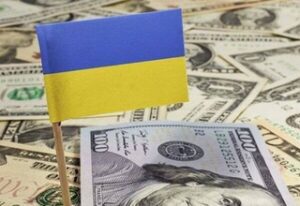
Ukraine is offering holders of GDP warrants issued for a nominal amount of $2 billion 591.219 million to exchange them at a ratio of 1.34 for new amortized Eurobonds of Ukraine B maturing in 2030-2032 and to pay cash compensation of up to 7% for such an exchange, according to a proposal on the Irish Stock Exchange and Cabinet of Ministers Resolution No. 1554 of December 1.
It notes that Ukraine and the special committee of GDP warrant holders made significant progress on the terms of such an exchange in the next round of negotiations from November 25 to 30, but the search for full agreement will continue in the coming days in order to reflect the results of such consultations in the relevant amendments to the Memorandum of Exchange by December 5.
The basic terms provide that 45% of the principal amount of the new Eurobonds B will be redeemed on February 1, 2030, and 2031, while the remaining 10% will be redeemed on February 1, 2032.
The interest rate on these bonds will be 4% per annum from the date of placement until February 1, 2027, then 5.5% until August 1, 2029, and 7.25% per annum for the remaining period until maturity.
Holders of GDP warrants who agree to the exchange during the early acceptance period, up to and including December 12, will receive an additional cash payment of 7% ($70 for every $1,000 of the principal amount of GDP warrants), while those who do so between December 13 and 17 inclusive will receive 4.5%.
Finally, those who do not participate in the exchange, if it is approved, will receive other Eurobonds with a total ratio of 1.36 – Eurobonds B, which were issued during the restructuring of Eurobonds in 2024: at 0.68 – Eurobonds maturing in 2030 and 2034, with an interest rate of zero until February 1, 2027, 3% until August 1, 2033, and 7.75% per annum thereafter.
It is noted that the quorum for making a decision is 75% of the total nominal amount, and the decision is expected on December 22. At the same time, even with the consent of 50% of GDP warrant holders, Ukraine can initiate their delisting from the exchange.
According to the Frankfurt Stock Exchange, GDP warrants rose in price on Monday by 0.66% to 92.15% of their nominal value. The last time they were more expensive was in October 2021, after which their value fell below 20% of their nominal value in certain periods.
As reported, from October 16 to November 5, representatives of Ukraine held a series of limited negotiations with a special committee, which includes institutional holders of GDP warrants, during which the parties twice exchanged proposals for their restructuring without result.
Among the warrant holders are hedge funds Aurelius Capital Management LP and VR Capital Group. They are advised by Cleary Gottlieb Steen & Hamilton LLP and PJT Partners Inc, while the Ukrainian side is advised by White & Case LLP and Rothschild & Co.
Following the autumn round of negotiations, the Ministry of Finance emphasized that Ukraine intends to continue working with warrant holders and consider all available options for their restructuring that are consistent with the three previously stated objectives: restoring debt sustainability in accordance with the IMF program; the commitments made during the restructuring of Eurobonds in August 2024 to distribute the burden appropriately among all commercial claims within the restructuring; the moratorium on warrant payments from May 31, 2025, until the completion of their restructuring, approved by the government on August 27, 2024.
Ukraine’s revised proposal during those autumn negotiations was to compensate for the missed payment on warrants for the 2023 reporting year, which was due on June 2, 2025, and to exchange the warrants for a partial cash payment and a new series of sovereign bonds (“C Bonds”). Under Ukraine’s proposal, holders of GDP warrants who agreed to this restructuring option would receive $60 in cash and C Bonds with a par value of $1,260 for every $1,000 of notional value of the warrants. These bonds would be redeemed in three equal installments on January 30, 2030, 2031, and 2032. Interest on them would be paid semi-annually at rates of 2.50% for 2026-2027, 4% for 2028-2029, and 6.00% for 2030-2032.

Ukraine’s second-largest mobile operator, Vodafone Ukraine (VFU), which on May 23 announced an offer to repurchase its Eurobonds worth $1.11 million, has received bids significantly exceeding the repurchase amount.
“The offered bonds will be accepted for purchase on a pro rata basis in accordance with a scaling factor of 0.0040355668,” the issuer said in a statement on the Irish Stock Exchange on Monday.
According to the statement, if the application of this ratio to the bond package of any holder results in an amount less than the minimum nominal value, such offered bonds will be rejected.
The settlement date for the tender offer will be approximately June 13, 2025.
The redemption of Eurobonds is related to the fact that on April 24, 2025, VFU announced the payment of dividends to its shareholder in the amount of UAH 660.245 million ($15.9 million at the exchange rate specified in the announcement) for 2024. According to the restrictions of the National Bank, they will be paid in separate monthly dividend payments. Each such monthly dividend is expected to amount to EUR1 million in hryvnia.
The company emphasized that, according to the terms of the bond issue, in this case, it must offer all bondholders to submit an application for their sale for an amount equal to the amount of dividends paid outside Ukraine.
According to the announced terms, the bonds will be redeemed at a rate of 99% of their face value.
VFU recalled that a total of $300 million in bonds maturing in February 2027 with a nominal rate of 9.625% per annum were issued, of which the company currently holds $0.5 million in bonds.
As reported, VFU increased its revenue by 13.1% to UAH 24.44 billion in 2024, while reducing its net profit by 30.1% to UAH 3.54 billion.
In January-March 2025, revenue grew by 14% compared to the same period in 2024, to UAH 6.59 billion, while net profit fell by 24% to UAH 697 million.

Ukraine’s second-largest mobile operator, Vodafone Ukraine (VFU), has announced a proposal to buy back its Eurobonds worth $1.11 million in connection with the company’s first monthly dividend payment to shareholder Telco Investments B.V. in the amount of UAH 46.092 million on May 14 this year.
As the company explained in a stock exchange announcement on Friday, according to changes made by the National Bank of Ukraine on December 21, 2024, it is now permitted to pay dividends abroad on a monthly basis in an amount not exceeding EUR 1 million per month.
Accordingly, on April 24, 2025, VFU announced the payment of dividends to its shareholder in the amount of UAH 660.245 million ($15.9 million at the exchange rate specified in the announcement) for 2024 and intends to pay them in separate monthly dividend payments. Each such monthly dividend is expected to amount to the equivalent of EUR1 million in hryvnia.
The company emphasized that, in accordance with the terms of the bond issue, in such a case it must offer all bondholders the opportunity to apply for the sale of their bonds for an amount equal to the amount of dividends paid outside Ukraine.
According to the announced terms, the bonds will be redeemed at 99% of their face value.
VFU recalled that a total of $300 million worth of bonds maturing in February 2027 with a nominal interest rate of 9.625% per annum were issued, of which the company currently holds $0.5 million worth of bonds.
Applications for participation in the buyback will be accepted until June 6 inclusive.
As reported, VFU increased its revenue by 13.1% to UAH 24.44 billion in 2024, while reducing its net profit by 30.1% to UAH 3.54 billion.
In January-March 2025, revenue grew by 14% compared to the same period in 2024, to UAH 6.59 billion, while net profit fell by 24% to UAH 697 million.

Metinvest B.V. (the Netherlands), the parent company of a vertically integrated group of steel and mining companies, has paid a regular coupon on its 2027 Eurobonds and continues to meet its debt obligations, including to Eurobond holders, despite the war in Ukraine.
“We can confirm that the coupon was paid on time,” Andriy Burlakov, Metinvest Group’s press secretary, told Interfax-Ukraine in response to a query.
Coupon payments on the 2027 Eurobonds are due on March 1.
“On March 1 and September 1 of each year, starting from March 1, 2021,” the information on the payment of coupons on the 2027 bond states.
“Metinvest is a vertically integrated group of steel and mining companies. Its businesses are located in Ukraine, in Donetsk, Luhansk, Zaporizhzhia and Dnipro regions, as well as in the European Union, the United Kingdom and the United States.
The main shareholders of the holding are SCM Group (71.24%) and Smart Holding (23.76%), which jointly manage it.
Metinvest Holding LLC is the management company of Metinvest Group.

State-owned Ukreximbank has raised the interest rate on its Eurobonds due November 14, 2029 from November 14, 2024 to 10.45% per annum, according to a stock exchange announcement by the issuer of these Eurobonds, Biz Finance Plc, on Wednesday.
According to it, the interest rate on the loan provided to the bank through the issuance of these Eurobonds has been raised to 11% per annum.
As reported, in November 2019, the bank, through Biz Finance, issued Eurobonds in the form of loan participation notes with a total nominal value of $100 million with a fixed coupon rate of 9.95% per annum and maturity in November 2029 with the possibility of early redemption in November 2024 solely for the purpose of financing the bank’s subordinated debt. Interest is payable semi-annually on May 14 and November 14.
According to Ukreximbank’s reporting, as of the middle of this year, its liabilities under the other Eurobonds issued in 2013, which finally mature on January 22, 2025, amounted to $40.566 million.
These Eurobonds, originally issued in the amount of $600 million and due in 2018, were reprofiled on July 9, 2015, with the following terms: coupon rate of 9.75% per annum; final maturity was extended by 7 years, i.e. to January 22, 2025. At the same time, 50% of the Eurobonds will be redeemed on January 22, 2021, and the remaining 50% of the bonds will be redeemed between July 22, 2021 and January 22, 2025 in eight equal semi-annual installments. In 2020 and 2022, the bank repurchased these bonds for a total amount of $238.006 million at par and canceled them.
Ukreximbank was established in 1992. The sole owner of the financial institution is the state.
According to the NBU, as of September 1, 2024, the bank ranked 3rd in terms of total assets with UAH 299.42 billion among 62 active banks. Its net profit in the first eight months of this year amounted to UAH 5.36 billion, which is 73.4% more than in the same period last year.

Metinvest Mining and Metallurgical Group has announced a tender offer to buy back up to $70 million of its Eurobonds due 2025 and 2026.
According to a stock exchange announcement by Metinvest B.V., the 2025 Eurobonds will be redeemed at a price ranging from 85% to 92% of the face value, depending on the results of the Dutch auction, while the redemption price of the 2026 bonds has not been determined and will depend on the results of the auction.
The bonds will be purchased for cash.
The offer is valid from April 29, 2024 and expires at 16:00 London time on May 8, 2024.
The Eurobonds due June 17, 2025 were issued in the amount of EUR300 million with a coupon of 5.625%, and the Eurobonds due April 23, 2026 were issued in the amount of $505 million with a coupon of 8.5%. Currently, they are outstanding by $234.195 million and $493.871 million, respectively.
“The rationale for the offer (to repurchase – IF-U) is to use the group’s liquidity outside Ukraine to actively manage the company’s debt burden, mitigate cash outflows for debt service, improve the group’s overall debt position, and reduce liquidity pressure in relation to the upcoming maturities of the 2025 bonds and 2026 bonds, given the group’s continued turbulent operating environment,” the tender offer explains.
It adds that the ongoing war in Ukraine, coupled with volatile commodity prices, presents unprecedented challenges for the company and its subsidiaries.
In addition, although as at 31 December 2023 the company and its subsidiaries outside Ukraine had sufficient cash balances to meet the company’s scheduled interest payment obligations for the foreseeable future, there are certain restrictions on the transfer of cash from its Ukrainian subsidiaries in accordance with the current decisions of the National Bank of Ukraine. And there is no guarantee that these restrictions will be lifted, the document says.
In turn, the proposals give bondholders the opportunity to reduce their risks in the context of the ongoing war. The group’s operations remain subject to a number of risks that are beyond management’s control, including, in particular, an increase in the intensity of Russian attacks on the front line; escalation of attacks on Ukraine’s energy facilities and, as a result, disruption of the availability of the energy system for the group’s operations; uncertainty about the sustainability of Black Sea shipping; staff shortages due to mobilization in Ukraine; and volatile prices for key products.
These risks may adversely affect the price of Eurobonds in the future, the tender justification states.
“Metinvest is a vertically integrated group of steel and mining companies. Its businesses are located in Ukraine – in Donetsk, Luhansk, Zaporizhzhia and Dnipro regions – as well as in the European Union, the United Kingdom and the United States.
The main shareholders of the holding are SCM Group (71.24%) and Smart Holding (23.76%), which jointly manage it.
Metinvest Holding LLC is the management company of Metinvest Group.